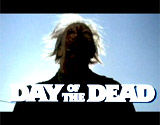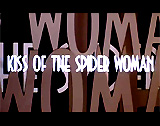
|
![]()
Greatest Films of the 1980s
1980 | 1981 | 1982 | 1983 | 1984 | 1985 | 1986 | 1987 | 1988 | 1989
Title Screen Film Genre(s), Title, Year, (Country), Length, Director, Description 


Back to the Future (1985), 116 minutes, D: Robert Zemeckis
See series: Back to the Future (1985-1990).
Director Robert Zemeckis' witty, blockbuster science fiction adventure comedy/fantasy film was about a time-traveling teenager who had the opportunity to re-create and transform his parents - it was the highest-grossing film of its year. In the small town (fictional) of Hill Valley, CA, clean-cut, skateboarding teen "Marty" Seamus McFly (Michael J. Fox), who aspired to play guitar in a R& R band, lived with his hapless middle-class parents: nerdy, cowardly, unhappy and weak-willed George McFly (Crispin Glover) who was bullied and tormented at work by his boss Bill Tannen (Thomas F. Wilson), and his alcoholic, apathetic and depressed mother Lorraine Baines/McFly Lea Thompson). Marty's surrogate father figure, the madly-eccentric, wild-eyed, crackpot scientist Dr. Emmett "Doc" Brown (Christopher Lloyd), conducted his first testing of his modified time-travel car at Twin Pines Mall in the early morning hours of October 26, 1985, with a travel destination dated November 5, 1955. The frizzy-haired Doc unveiled his time machine invention to Marty - it was a silver DeLorean car (with a "flux capacitor"), powered up to 1.21 gigawatts of electricity with an energy source of plutonium (that had been stolen from Libyan terrorists). The two witnessed Doc's dog Einstein's short one-minute time-travel trip into the future ("temporal displacement") in the parking lot (at 88 mph), with Doc's ecstatic reaction. When the angry Libyan terrorists approached in a van, they shot and lethally-wounded Doc, but Marty was able to escape in the DeLorean - arriving 30 years earlier in 1955. In a mid-50s diner, Marty witnessed loutish bully Biff and his gang harrassing his future father, George; later, Marty tripped Biff and punched him in the face in the diner - and then fled. He created a makeshift skateboard ("It's a board with wheels") - not yet invented - from a little boy's scooter and evaded the group chasing him on foot and in their car by hanging onto the back of a pickup truck. His actions had unintended consequences - his future mother, teenaged Lorraine Baines, was falling in love with him ("He's an absolute dream"). Without plutonium to return to the future, Marty met with a younger version of Doc, who advised him that the only available powerful energy source would be a bolt of lightning; Marty showed Doc a flyer from the future that reported an upcoming lightning strike that shattered the town's courthouse clock-tower. Still stuck in the year 1955, Marty attended his teenaged parents' 1955 "Enchantment Under the Sea" prom night dance, where he attempted to encourage a romance between his future father and mother George and Lorraine (otherwise he would cease to exist in the 1980s). Marty played lead guitar and sang the 1950's rock 'n' roll song Johnny B. Goode [originally recorded by Chuck Berry in 1958] when the lead musician was put out of commission. To help Marty return "back to the future" of 1985, the film's conclusion converged at the courthouse-town hall's tower (with a clock face). "Doc" Brown dangled from the clock face while attempting to reconnect the wires so that a bolt of electricity from a lightning strike would flow into the flux capacitor of the speedy DeLorean (that had to be traveling 80 mph to make the time leap) occupied by Marty. Marty successfully returned to 1985 (ten minutes before his earlier departure), and "Doc" was saved from death in the Libyan terrorist attack by taking Marty's future advice by wearing a precautionary bullet-proof vest to protect him. After Marty was returned home, "Doc" took off to the future year of 2015, thirty years into the future. Marty realized that the present year of 1985 had now been drastically altered and transformed - Marty's parents (and his siblings) were now happy, physically in great shape and productively employed, and Biff had been demoted and served as George's valet. In the twist ending, "Doc" Brown suddenly returned to 1985 Hill Valley from the future year of 2015 in his silver DeLorean time machine vehicle, shouting: "Marty! You've gotta come back with me!...Back to the future!" Marty and his pretty girlfriend Jennifer Parker (Claudia Wells) got into the car, when "Doc" told them of his worries about their future children: "No, no, no, no, no, Marty. Both you and Jennifer turn out fine. It's your kids, Marty! Something has gotta be done about your kids!" As "Doc" squealed out of the driveway to take off, Marty noted: "Hey, Doc. We better back up. We don't have enough road to get up to 88." Doc smugly replied with a famous line: "Roads? Where we're going, we don't need roads!" The DeLorean unexpectedly levitated into the air, then zoomed down the street, turned, and flew directly into the camera.




Brazil (1985, UK), 131 minutes, D: Terry Gilliam
Director Terry Gilliam's eccentric, offbeat, satirical ultra-dark comedy was a hybrid work, combining science-fiction, despairing ultra-black comedy and fantasy. It told about an oppressive and repressive, polluted, decaying future dystopian world of conformity, bureaucracy and Big Brother totalitarianism in a terrorist-threatened Londonesque metropolis. There were many visually-imaginative references to Kafka's The Trial (and Orson Welles' The Trial (1962)), Orwell's 1949 novel 1984 (and Michael Radford's 1984 (1984)), and Anthony Burgess' 1962 A Clockwork Orange (and Stanley Kubrick's A Clockwork Orange (1971)). It had other similarities to Fritz Lang's mechanized society in Metropolis (1927), Kubrick's Dr. Strangelove: (1964), and the 'book-burning' of Fahrenheit 451 (1966). Mild-mannered and meek bureaucratic statistician Sam Lowry (Jonathan Pryce), a low-ranking civil servant Everyman, worked in the regulatory Ministry of Information (MOI), jammed with paperwork and filled with endless pneumatic tubes and ill-functioning equipment. When a literal beetle was squashed in an office teletype printer and caused a typographical error that altered an arrest record, it unjustly identified an innocent citizen Mr. Archibald Buttle as suspected terrorist Archibald "Harry" Tuttle (Robert DeNiro). When Lowry investigated the case of mistaken identity (and the wrongful arrest and death of Buttle) and attempted to unravel it, he imagined himself as a lone heroic, silver-winged warrior knight-savior combating evil (ultimately embodied in the technological threats of the Machine Age). He would fly in the clouds toward a blonde fantasy-dream girl (Kim Griest), a doppelganger (a truck driver in the real world named Jill Layton (also Griest)) to rescue her and win her love. Jill's desire to help Mrs. Buttle sort out the error and find the real Mr. Buttle caused her to become regarded as a suspected terrorist and political dissident. Meanwhile, the self-deluded Sam became the subject of study by the totalitarian regime. His vain efforts to clear Jill's name ended when he was wrongly aligned with the rebellion, and his friend-turned-sinister MOI official Jack Lint (Michael Palin) arrested him for treason. He was detained in a large cylindrical room to be persecuted and tortured. A surrealistic fantasy ultimately saved him when he imagined himself escaping with the help of Tuttle and other resistance members, and leaving the city with Jill - in a happy ending - to an illusory idyllic paradise that was free of societal restrictions. However, it was all a delusional dream while he was strapped to a torture chair - and he died (as he hummed the film's theme song - Ary Barroso's "Aquarela do Brasil" or "Brazil").

The Breakfast Club (1985), 92 minutes, D: John Hughes



Cocoon (1985), 117 minutes, D: Ron Howard
Director Ron Howard's and 20th Century Fox's sentimental sci-fi fantasy (the director's second feature film after his hit comedy Splash (1984)) was a big sleeper hit. The story, with some tear-jerking and comedic elements, told about the eternal 'Fountain of Youth' myth and old age mortality, mixed with an alien encounter tale. The film opened by introducing a close-knit group of six friends - all geriatric seniors, who were residents in Florida's Sunny Shores retirement home in St. Petersburg, FL. The group included three couples: Ben Luckett (Wilford Brimley) and his wife Mary (Maureen Stapleton), Joe Finley (Hume Cronyn) with terminal cancer and his wife Alma (Jessica Tandy, Cronyn's real-life wife), and Bernie Lefkowitz (Jack Gilford) with his dementia-suffering wife Rosie or "Rose" (Herta Ware). A seventh individual was a close friend - debonair ex-naval officer and widower Arthur "Art" Selwyn (Best Supporting Actor Oscar-winner Don Ameche), who was flirtatious with perky, red-headed Bess McCarthy (Gwen Verdon), the senior-aged retirement home's dance instructor. Three of the mischievous male seniors: Ben, Joe, and Art, regularly snuck away from the retirement home to go swimming, by trespassing into a neighbor's indoor swimming pool (in a poolhouse) that was vacant and unattended. Meanwhile, struggling charter boat operator and tour guide Jack Bonner (Steve Guttenberg), was approached by a well-dressed quartet of vacationing "cousins" led by middle-aged Walter (Brian Dennehy) who hired Jack's boat for underwater dives for an entire month (27 days). At the same time, Walter and his foursome also rented the property and poolhouse where the elderly seniors were trespassing and continued to swim. During dives into the Gulf of Mexico on Jack's boat, Walter and his crew brought up to the surface four enormous, weird, oyster-shelled, barnacled or rock-like "cocoons" from the ocean floor. The strange shells were deposited and stored in the luxurious indoor swimming pool inside the pool-house of the home, where the four elderly males came for daily swims. The older gentlemen discovered that for some reason, they were rejuvenated with a "life force" as a result of being in the cocoon-filled pool. The men exuded vitality, passion, and increased libido, and that evening, each of them had a renewed romantic spunk toward their wives and fellow retirement home residents. After one of the dives, the gorgeous "Kitty" (Tahnee Welch), one of the four vacationers with whom Jack took a romantic interest, was spied upon as she undressed in one of the boat's cabins, and he suddenly realized that she was an alien life form when she removed her human skin mask, revealing her golden body. Walter was forced to explain that all of the group members were benevolent extra-terrestrial aliens from the planet of Antarea who had settled an Atlantis outpost on Earth about 100 centuries earlier; the aliens had to abandon and evacuate their settlement when during the "first upheaval," it sank to the ocean floor. They left 20 "ground crew" members behind - encased in the cocoons in a state of suspended sleep. Jack felt obliged to agree to help in their recovery effort. The next time the seniors went swimming, when the neighbors returned, they hid in the pool's changing room and watched as the group of aliens removed their skin masks, revealing golden glowing bodies underneath and how they could move unhindered through the air. The sight of the golden creatures scared off the elderly group who fled in horror. Without the use of the pool, the seniors began to lose the restorative effects of the pool water; in the group, cancer-suffering Joe was showing signs of exhaustion and a return of symptoms. Ben spoke to Walter to seek permission to continue to swim in the pool, and he was granted permission if they promised to keep silent about the cocoon-pods and didn't touch them. However, the retirement home folks were unable to avoid bragging and showing off their youthful capabilities, and the secret of the pool was accidentally disclosed to the other residents. As a result, the pool was stampeded by dozens of the elderly residents and one of the pods was seriously damaged, causing the death of the "ground crew" alien member inside. All of the life-giving, revitalizing qualities of the nearby magical swimming pool (designed to rejuvenate all of the Antareans in the cocoons) were depleted. When Walter told an apologetic Ben that he had run out of time to take the remaining cocoons back to the ocean floor for safekeeping where they could be picked up during a future mission, Ben volunteered his group of friends (and wives) to help. After the pods were returned to the Gulf overnight, the group plus about 30 more of their retirement home friends were given the choice to return with the aliens to their unknown planet, where they would become immortal (never grow old or die or suffer from pain and disease). The film concluded the next evening with a large group of retirees on-board Jack's boat, and a exciting pursuit into the Gulf after them by the police and the Coast Guard, who charged them with suspected kidnapping. The gigantic Antarean spacecraft arrived just in time to rescue them by raising up Jack's entire charter boat (with the space-astronauts on board) before returning to its home planet.
The Color Purple (1985), 152 minutes, D: Steven Spielberg
This masterful, sentimental and moving period drama, based on the Pulitzer Prize-winning novel by Alice Walker, marked a major change from Spielberg's previous spate of escapist summer blockbusters. It garnered eleven Oscar nominations, although it suffered a record shut-out. It followed the survival story of an African-American woman in the early 1900s, Celie Harris (Whoopi Goldberg), against the forces of loneliness, poverty, and physical and emotional abuse. She was transformed into a life of courage and self-realization through the love, friendship, and guidance of two other females, her brutal husband's mistress Shug Avery (Margaret Avery) and outspoken Sofia (Oprah Winfrey).

Day of the Dead (1985), 103/96 minutes, D. George A. Romero
Part 3 of Romero's original zombie trilogy. This third film was regarded as the most dialogue rich and the goriest in the original trilogy. The film cleverly set the genre on its head again, showing how the living dead were misunderstood and oppressed. With the character of semi-intelligent, humanized zombie "Bub" (Sherman Howard). Although not well received originally - and the lowest-grossing film of the three - it has since become a cult classic after revisionist thinking. In this sci-fi disaster film, 'undead' flesh-eating zombies had taken over the world (at a ratio of 400K to 1). Human survivors, including two competing groups: mad scientists (experimenting on hostile, specimen zombies) and the military (trigger-happy soldiers), were trapped inside a claustrophobic, underground missile silo installation, located in Florida. Fascistic, megalomaniac Captain Rhodes (Joseph Pilato) was in charge. In an era of Reaganite militaristic politics obsessed with science, this claustrophobic tale told of sadistic experiments performed on zombies in a subterranean bunker. Dr. Matthew Logan (Richard Liberty), known as "Frankenstein," was experimenting with the domestication of zombies, while scientist Dr. Sarah Bowman (Lori Cardille) was struggling to find a cure for the apocalyptic plague and epidemic of undead swarming throughout the country. Its climax was non-stop dismemberment, disembowelment, and beheadings, as the zombies took over the complex. Rhodes was ripped apart at the waist by the undead creatures. He defiantly yelled out with his intestines exposed: "Choke on 'em!"



The Emerald Forest (1985, UK/US), 113 minutes, D: John Boorman



The Goonies (1985), 114 minutes, D: Richard Donner





Jagged Edge (1985), 108 minutes, D: Richard Marquand
This early Joe Eszterhas-penned courtroom thriller and mystery 'who-dun-it' contained a number of unpredictable surprises and twists. In the film's opening, set during a thunderstorm in San Francisco at a remote beach house, wealthy socialite/heiress Mrs. Paige Forrester (Maria Mayenzet) was murdered by a hooded, unidentified attacker (with a ski mask and black leather clothing) who wielded a jagged-edged knife blade and slit her throat. The word "Bitch" was scrawled in blood on the bedroom wall. A maid was also killed (off-screen), and her husband Jack Forrester (Jeff Bridges) also suffered a head wound. However, Jack became a prime suspect and was arrested on charges of double homicide after prosecutor Thomas Krasny (Peter Coyote) learned that he was to inherit his wife's entire SF Times publishing empire fortune. Forrester was also suspected when a jagged hunting knife was seen in his country club gym locker (# 122) by janitor Fabrizi (Louis Giambalvo). Ex-prosecutor and civil rights litigator with a high success rate, Teddy Barnes (Glenn Close), a divorced mother with two children, agreed to defend Forrester when a lie detector test proved positive. Things became much more complicated when Teddy began a passionate affair with her handsome client. During the case preparations, Krasny suspected that Jack's head wound was self-inflicted. Barnes' office began to receive anonymous typewritten notes (from a 1942 Corona typewriter), including clues about the case, and statements that Forrester was innocent. The judge in the case was Judge Carrigan (John Dehner). Prosecutor Krasny revealed that if Paige had divorced Jack, which was her intention (since they were both unfaithful to each other), Jack wouldn't have received the fortune. Pretty Virginia Howell (Leigh Taylor-Young) admitted that she had tried to have sex with Jack, but was jilted. Tennis pro Bobby Slade (Marshall Colt) testified that he had slept with Mrs. Forrester, and used the word "Bitch" to describe her. Another tennis club member admitted to having a jagged knife in his locker (# 222). Surprise defense witness Julie Jensen (Karen Austin), referred to one of the typed clue-notes, testified that 18 months earlier, she was attacked in the same manner as Paige Forrester - to prove that the defendant committed the similarly charged crime. However, Forrester was found not guilty. Soon after, Barnes found an incriminating typewriter (with a unique typeface including elevated 't's', that were found in all of the anonymous letters) in Forrester's closet, and confronted him with the information. In the nail-biting conclusion, a ski-masked figure entered her bedroom late at night with the murder weapon - a jagged-edged knife. She was ready for him - she shot him a number of times with a concealed gun. When he was unmasked by detective Sam Ransom (Robert Loggia), it was revealed that it was Jack who was the attacker (Ransom: "F--k him, he was trash").


Kiss of the Spider Woman (1985, Braz./US/Arg.), 119 minutes, D: Hector Babenco
Argentinian-born director Hector Babenco's Brazilian/American co-produced melodramatic R-rated film, was a small independent film based upon Manuel Puig's 1976 novel. It was historically important as one of the first (if not first) gay films that was heralded by the mainstream media. Its major themes were gender roles, toleration of differences, escapism from reality through fantasy, oppression, political idealism, and betrayal. Two major cellmates - both 2nd class citizens living in a repressive political dictatorship, developed a deep friendship while they were incarcerated in the 1970s in a South American (Brazilian) prison (Pavilhao IV). They were Luis Molina (William Hurt with a Best Actor-winning performance) - a flamboyant, effeminate, tall, 41 year-old homosexual sex offender accused and convicted of "corrupting a minor" and sentenced to an 8-year prison term. He was a long, red tinted-haired drag queen and a great story-teller, and a former department store window-dresser. The second man was Valentin Arregui (Raul Julia) - a bearded, 34 year-old cynical political prisoner, leftist journalist and radical Marxist revolutionary who was jailed for inciting political unrest against the repressive government and became a martyr for the movement. Molina often entertained the two of them by fancifully escaping their predicament in prison and passing the time through story-telling. Molina continued to describe his fond memories of an old noirish B-film - a 1940s, anti-Semitic Nazi propaganda film. The remembered film - framed as a "film-within-a-film" - was shown as interspersed, sepia-toned "clips." It was a romantic thriller in which Leni Lamaison (Sonia Braga), during the Vichy-era French Resistance, fell in love with dashing and blonde Aryan officer Werner (Herson Capri) - Chief of Counter-Intelligence in France and an enemy Nazi SS soldier. Leni was portrayed as a femme fatale Spider-Woman - "the most ravishing woman in the world." Other characters included patriot leader Clubfoot (Antônio Petrin), and nightclub cigarette girl Michele (Denise Dummont). In Molina's film tale, Michele lost her life when she was deliberately run over by Clubfoot for engaging in a love affair with German lieutenant Hanschen. After Michele's death, Leni was reluctantly pressured by the rebels to acquire a secret map to the German arsenal from her lover Werner. She was romanced by Werner in his luxurious chateau, and fell in love with him, but realized she must betray him since he was in charge of executing Resistance patriots. At the end of the Nazi film, Leni was about to betray him in the dark castle of a Resistance leader (Nildo Parente) by turning over the secret map. In a surprise twist, when the sex-hungry Resistance leader assaulted her, she stabbed him in the back with a steak knife. She fled and rushed into Werner's embrace and kissed him, but then was shot by another dying patriot named Flunky (Wilson Grey) and perished in Werner's arms. During Molina's interspersed film scene descriptions, Valentin was disgusted and repelled by both Molina's self-hating homosexuality ("You damn faggot!") and his trivial romanticization of Nazi fascist propaganda. The film's plot twist was that in prison as he befriended Valentin, Molina was actually working undercover with the prison's corrupt Warden (José Lewgoy) and abusive, homophobic secret police officer Pedro (Milton Gonçalves). Molina's objective was to cautiously gather vital information from Valentin to help identify other traitors, accomplices, and anti-government groups. In exchange for betraying Valentin ("The quicker he talks, the quicker you get out"), he bargained for food and for early parole. Just before being paroled, Molina imagined and spun a new film tale (with a bluish-purple tint) of tropical romance on a desert island - an allegorical tale about the two of them. The central character was a masked "strange woman" (again Sonia Braga) with a black gown, who "was caught in a giant spider web that grew from her own body." One night when a shipwrecked man (portrayed by Raul Julia) drifted onto the beach, she cared for him, "nourished him with love," and brought him back to life. Gradually, the two prisoners had also become unlikely compatriots who ultimately developed compassion for each other. Molina was increasingly feeling conflicted about his deal to betray Valentin after falling in love with this "real man." When Molina suggested that they make love on his last night in prison, Valentin complied, and they came together in the dark (off-screen). The film concluded with Molina's release (and a farewell kiss from Valentin). Molina was melancholy after his return to society and to his mother (Míriam Pires), as he often sat silent at a bay window looking out at the city. He was unaware that he was under surveillance by agents who wanted him to lead them to the cadre of Valentin Arregui. Finally, he mustered the courage to make contact with the rebels (with a secret message from Valentin). He phoned from a subway pay-phone, and then withdrew wads of cash from his bank account to provide for his mother's care. After bidding goodbye to his mother, he wore a tell-tale red scarf to signal his identification to the rebels. In the city streets and the busy town square, Molina was pursued by Pedro and other agents, as he made contact with Valentin's girlfriend Lidia (Ana Maria Braga) in a taxi. Gunfire erupted when the agents charged forward. Lidia's taxi took off as Molina fled from the agents. The taxi reappeared, and Lidia - who suspected he was an informant, shot and mortally-wounded Molina in the chest before racing away. His death mirrored the death of his heroine Leni in the Nazi propaganda film. He was thrust into a car at gunpoint by Pedro and while he was dying, Molina self-sacrificially and heroically refused to divulge the phone number. Once his body went limp, he was dumped onto a pile of trash in a shanty-town. The authorities spread a false story about how he had collaborated with the extremist revolutionaries and was shot dead by them. The same fate also arrived for Valentin back in prison - where he had been tortured mercilessly with electricity. A prison intern-medic in the infirmary decided to inject him with a potent overdose of a pain-killer (morphine), to release him into the escapist world of film (into a romantic paradise). His death was a replay of the short 'Spider Woman' film described earlier by Molina. As he appeared to possibly die in a fanciful delirium, Valentin's former lover Marta (Sonia Braja) came to him, happily ran with him hand-in-hand out of the prison, and brought him - as the Spider Woman - to the idyllic desert island setting where he was miraculously healed and she assured him after kissing: "This dream is short, but this dream is happy."


Lost in America (1985), 91 minutes, D: Albert Brooks





My Beautiful Laundrette (1985, UK), 97 minutes, D: Stephen Frears


My Life as a Dog (1985, Swe.) (aka Mitt Liv Som Hund), 101 minutes, D: Lasse Hallstrom

The Official Story (1985, Argentina) (aka La Historia Oficial), 112 minutes, D: Luis Puenzo



Out of Africa (1985), 162 minutes, D: Sydney Pollack
Sydney Pollack's grandly-spectacular, handsome biopic romance, a Best Picture winner with Oscar-winning John Barry's marvelous score, harkened back to the old-style, sweeping epics of the 50s and 60s. The extravagant travelogue-romance was based by Kurt Luedtke on the life, works, and memoirs of Karen Blixen (a Danish writer who published under the pen-name Isak Dinesen). Spanning two decades in the early 20th century, the love pairing between its two major stars was very much embellished and put at the center of the story. The love story in the romantic biopic, similar in scope to David Lean's sprawling epics, was easily eclipsed by the more compelling, Oscar-winning, visually-poetic cinematography of exotic locations from beginning to end - an awesome, wonderful feast for the eyes. Meryl Streep portrayed the Danish Baroness who married and settled on a British East Africa coffee plantation with her disinterested philandering husband Bror Blixen (Klaus Maria Brandauer) who infected her with syphilis before leaving. Interlaced with gorgeous, lyrically-beautiful scenes on location in Kenya, Karen spent idyllic romantic days during a brief passionate affair with white game-hunter Denys Finch Hatton (Robert Redford) (modified to be American instead of British) - holding hands with him in a biplane, and having her hair shampooed by him during a safari. The highlight of the film was the safari, with many majestic views of the African plains with streaming herds of wildlife - photographed both from ground level and from a biplane. Although their relationship heated up, his demands for personal freedom doomed full commitment. The film came full circle as just before Karen was planning to return home, she attended Denys' funeral when he lost his life in a tragic plane crash.
Pale Rider (1985), 120 minutes, D: Clint Eastwood



Pee-Wee's Big Adventure (1985), 90 minutes, D: Tim Burton




Prizzi's Honor (1985), 130 minutes, D: John Huston
In the black comedy 'sleeper' hit about questionable loyalties, Jack Nicholson took the convincing role of Charley Partanna, a dedicated, proud and unquestioning hit-man for the powerful Prizzi boss 'family.' The dim-witted Charley was fatally-hooked and love-struck by sultry, Los Angeles-bred blonde Irene Walker (Kathleen Turner), a rival paid 'contractor' or hired assassin. After he asked, "Do I ice her? Do I marry her?" a bi-coastal, opposites-attract romantic courtship led to marriage. Unfortunately, their Mafia-associated love and work didn't mix well together, and they were both tasked with taking each other out. In the film's double-crossing confrontational bedroom scene, the two lovers armed themselves with a gun and knife to eliminate each other.


The Purple Rose of Cairo (1985), 84 minutes, D: Woody Allen



Ran (1985, Jp./Fr.), 160 minutes, D: Akira Kurosawa




Re-Animator (1985), 86/95/104 minutes, D. Stuart Gordon
A low-budget, horror comedy, and cult film favorite, similar to the Frankenstein tale. An adaptation of H.P. Lovecraft's early 1920s serial novella Herbert West: Re-Animator. After controversial medical experiments in Switzerland, corpse-reviving, nerdy medical student Herbert West (Jeffrey Combs) enrolled in Miskatonic University. He resumed his obsessive experiments with bringing corpses (and body parts) to life, with the help of Dan Cain (Bruce Abbott), a fellow co-worker/student and apartment roommate. West had developed a glowing green serum or reagent to regenerate life, first successfully demonstrated on Dan's dead cat Rufus. Dan reported Herbert to Dr. Alan Halsey (Robert Sampson), the Head or Dean of the medical school, and promptly had his student grant suspended and was barred from the school. Now under cover, Dan joined Herbert to prove the formula worked, using bodies from the school morgue. However, the reanimated corpses became violent, frenzied and blood-thirsty zombies. And one of them savagely attacked and killed Dean Halsey. Now that Halsey was a zombie, West's jealous and blackmailing superior and rival, brain surgeon Dr. Carl Hill (David Gale), operated on the Dean's zombie corpse, to attempt to steal West's work. In the climactic ending, Dr. Hill was decapitated by West, but then after reanimating - Hill sexually forced his headless self upon Dan's kidnapped fiancee, Megan Halsey (scream queen Barbara Crampton), daughter of the Dean, who was strapped nude to an operating table. In the amazing scene, the decapitated Dr. Carl Hill (carrying his own disembodied head) had oral sex ("head") with Megan. A free-for-all battle of reanimated, mind-controlled, beserk zombies led to the death of Megan (who was injected with the reagent and brought back to life).


The Return of the Living Dead (1985), 91 minutes, D. Dan O'Bannon
An enjoyable, original parody or black-humor satire (O'Bannon's directorial debut film) on the zombie subgenre, based loosely on George Romero's Night of the Living Dead (1968), about ghouls rising from the dead. With a heavy-metal punkish soundtrack. Created variations or new "rules" for Romero's zombies - the creatures could talk, walk at normal speeds, and they were more indestructible. The film began with the premise, told by Uneeda Medical Supply warehouse foreman Frank (James Karen) to new teen employee Freddy (Thom Matthews) that George Romero's cultish 1968 hit was based on a real-life incident. Frank described a chemical spill at a VA hospital that leaked into a morgue and reanimated all of the dead bodies. He then told how there was a military cover-up, and the reanimated bodies were shipped off for storage, and because of various blunders, the bodies accidentally came to their warehouse. When showing Freddy an old Army military drum of deadly toxic gas (that caused the dead to rise up) in the basement, Frank accidentally ruptured it - and released a deadly toxic gas, and animated a frozen cadaver in the facility. Boss Burt Wilson (Clu Gulager) recommended that they kill the cadaver, when Frank asked about the inherent difficulty in killing something already dead. Frank responded: "It's not a bad question, Burt." When they cremated the attacking, carnivorous, brain-hungry zombie (now in dismembered parts) at the nearby Resurrection Funeral Home, ashes from the fire caused acid rain that fell on an adjoining cemetery - unleashing more hordes of zombies onto the unsuspecting town, and upon the punkish teens who were partying in the graveyard.



A Room With a View (1985, UK), 117 minutes, D: James Ivory
A delightful comedy of errors tale of repressed Victorian romance and British conceit, adapted from E.M. Forster's novel. A proper Edwardian young girl (Helena Bonham Carter) with her elderly, guilt-ridden spinster chaperone/cousin (Maggie Smith) take a tourist holiday in Italy. There, she meets a free-spirited suitor (Julian Sands), but is whisked back to Surrey, England when romance develops. Back home, she is engaged to a prissy, dispassionate, self-possessed, intellectual gentleman (Daniel Day-Lewis). When she is reunited with the charming young man from Florence, she must make a defiant decision regarding her marital plans.

The Trip to Bountiful (1985), 105 minutes, D: Peter Masterson
Director Peter Masterson's sentimental and well-crafted, old-fashioned Americana family drama (and road film) was scripted by screenwriter Horton Foote who had adapted his own 1953 NBC-TV and Broadway play (featuring silent film actress Lillian Gish) into the film. Under the opening title credits, a mother and her young son ran through a field of bluebonnets. The "sleeper film" was set - flash-forward - in the late 1940s following WWII, beginning in the city of Houston, TX, where elderly but spirited, hymn-singing mother-in-law "Mama" - Mrs. Carrie Watts (Geraldine Page in a magnificent Best Actress winning performance) - was forced to live in the cramped apartment of her striving, put-upon, hard-luck son Ludie Watts (John Heard) and his shrill, nagging and self-centered, vain and controlling wife Jessie Mae (Carlin Glynn), who greedily pursued Carrie's monthly pension check. The crafty and stubborn-minded Mrs. Watts was determined to visit her childhood farm home in the Gulf coastal (fictitious) town of Bountiful, TX (between Houston and Corpus Christi) that she had not seen for 20 years, but had always been denied the trip by her protective son due to her age (and the trip's cost). One morning, she quickly packed her things and took a city bus to the train station, but eventually ended up in a Greyhound bus depot where she purchased a ticket to Harrison, TX (another fictional town), the nearest stop to Bountiful. She evaded and outwitted Ludie's and Jessie Mae's search for her in the depot and found herself befriended by a young, grieving fellow passenger named Thelma (Rebecca de Mornay), whose husband was serving in the military. She shared many emotional thoughts, including how she didn't love her husband, and hadn't been allowed by her father to marry her real love. After finally reaching her destination late at night, she was still 12 miles from Bountiful, and learned from the stationmaster Roy (Kevin Cooney) that her best friend from Bountiful, the town's last remaining resident, had died two days earlier. A search had been initiated for her by her son, prompting the local Sheriff (Richard Bradford) to detain her at the depot. When "Mama" calmed down, the kindly and considerate Sheriff volunteered to drive the yearning Mrs. Watts to her farm-home in the interim, to take her out to the 'ghost town' and her deserted and dilapidated house, overgrown with weeds. She recalled many memories to the Sheriff, including: "I don't know of anything prettier, than a scissortail flyin' through the sky!" She was ultimately able to reconcile with herself and find peace and happiness within herself that she had finally been able to visit her homeland before she died. Her son and daughter-in-law arrived to pick her up at the home. "Mama" listened as Ludie also called up old memories of the home, and confessed that he had repressed his own troubled and painful memories of his childhood. He also was saddened that he had not had children. As the group walked back to the car, after Jessie Mae had read off a list of house rules for "Mama" to follow, Ludie finally expressed his anger toward his wife. He insisted and resolved that they would not wrangle anymore with each other and live more tolerantly and peacefully together. Just before reaching the car, "Mama" sat down in the grass and said goodbye to Bountiful.




Witness (1985), 112 minutes, D: Peter Weir